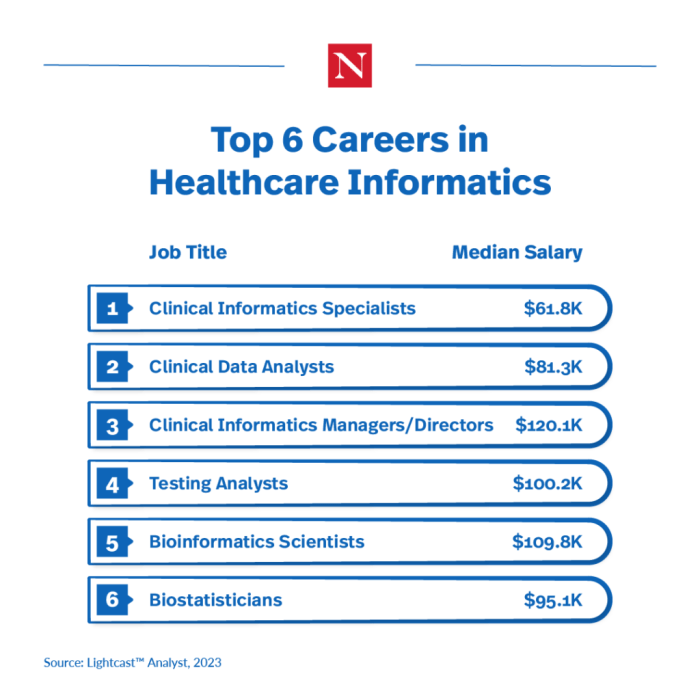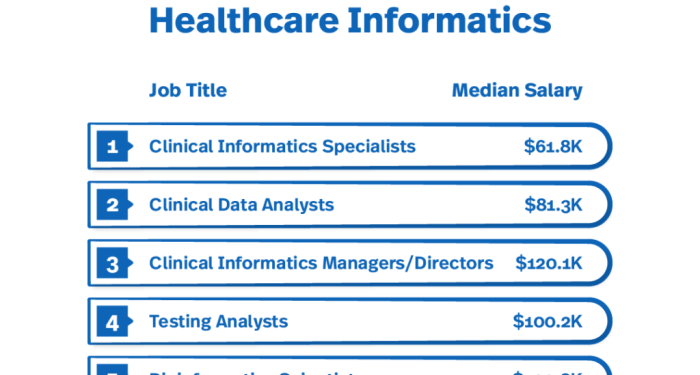Embark on a journey through the realm of Careers in Health Information Technology: Opportunities and Growth, where endless possibilities await those seeking a fulfilling and dynamic profession in the healthcare industry.
Delve deeper into the landscape of health information technology careers to uncover the intricacies and nuances that shape this evolving field.
Overview of Health Information Technology Careers

Health information technology professionals play a crucial role in the healthcare industry by managing and securing patient health information. They ensure the accuracy, accessibility, and confidentiality of electronic health records (EHR) and health information systems.
Various Job Titles and Responsibilities
- Health Information Technician: Responsible for organizing and managing health information data.
- Clinical Coding Specialist: Assigns codes to diagnoses and procedures for billing and data analysis.
- Health Information Manager: Oversees the maintenance and security of health information data.
- Health Informatics Specialist: Focuses on the design and implementation of health information systems.
Importance of EHR and Health Information Systems
Electronic Health Records (EHR) and health information systems streamline healthcare processes, improve patient care, and enhance communication among healthcare providers. They also support data analysis for research and quality improvement initiatives.
Educational Requirements and Certifications
- Minimum of an associate's degree in Health Information Technology or related field.
- Certifications such as Registered Health Information Technician (RHIT) or Certified Tumor Registrar (CTR) may be required for specific roles.
- Ongoing education and training to stay updated on industry standards and regulations.
Growth Opportunities in Health Information Technology
Health Information Technology (HIT) is a rapidly growing field with numerous opportunities for career advancement. As the healthcare industry continues to embrace digital transformation, the demand for skilled HIT professionals is expected to increase significantly in the coming years.
Projected Growth of Jobs in Health Information Technology
The Bureau of Labor Statistics predicts a 8% growth in employment for health information technicians from 2020 to 2030, which is faster than the average for all occupations. This growth is driven by the increasing need for healthcare services and the adoption of electronic health records.
Job Outlook for Different Specializations
Specializations within health information technology, such as Health Informatics, Health Data Analytics, and Health Information Management, are expected to have even higher job growth rates. For example, Health Informaticians are projected to see a 15% increase in job opportunities due to the growing importance of data analysis in healthcare decision-making.
Impact of Technological Advancements
Technological advancements, such as Artificial Intelligence (AI) and Machine Learning, are revolutionizing the way healthcare data is managed and analyzed. HIT professionals with expertise in these areas are in high demand, as they play a crucial role in optimizing healthcare systems and improving patient outcomes.
Emerging Roles in the Field
Emerging roles in health information technology include Telehealth Specialists, Clinical Documentation Improvement Specialists, and Cybersecurity Analysts. These roles cater to the evolving needs of the healthcare industry and offer exciting opportunities for career growth and development.
Skills and Qualities for Success in Health Information Technology
In order to excel in a career in Health Information Technology, individuals must possess a unique set of skills and qualities that are essential for success in this field. These skills not only help professionals effectively manage health data but also ensure the delivery of quality patient care.
Essential Skills for Health Information Technology
- Attention to Detail: Health information technicians must have a keen eye for detail to accurately record and maintain patient health records.
- Analytical Skills: The ability to analyze data and identify trends is crucial in interpreting complex medical information.
- Technical Proficiency: Proficiency in using electronic health record systems and other healthcare software is essential for managing health data efficiently.
Importance of Communication Skills and Teamwork
Effective communication skills are vital in Health Information Technology to collaborate with healthcare providers, patients, and other professionals. Working in multidisciplinary teams requires strong communication abilities to ensure seamless information exchange and decision-making processes.
Problem-Solving Skills in Health Information Technology
Health Information Technology professionals often encounter challenges such as data breaches, system failures, or regulatory compliance issues. Demonstrating strong problem-solving skills is essential to address these issues promptly and implement effective solutions to safeguard patient information.
Staying Updated with Industry Trends and Regulations
“In the fast-paced healthcare industry, staying informed about the latest technological advancements and regulatory changes is crucial for Health Information Technology professionals.”
Remaining up-to-date with industry trends and regulations ensures compliance with standards and enables professionals to adapt to new technologies, ultimately improving the quality of healthcare services provided.
Career Pathways and Advancement in Health Information Technology
As professionals in the field of Health Information Technology gain experience and expertise, there are various career pathways and opportunities for advancement that they can explore. These pathways not only offer growth but also allow individuals to specialize in specific areas of healthcare technology.
Health Informatics
Health informatics is a prominent career pathway within Health Information Technology that focuses on the management of healthcare data and information. Professionals in health informatics analyze and utilize data to improve healthcare delivery, patient outcomes, and overall efficiency within healthcare systems.
Data Analysis
Data analysis is another crucial career pathway in Health Information Technology, where professionals work with large datasets to extract valuable insights and trends. By interpreting data, these individuals help healthcare organizations make informed decisions and optimize their processes.
Healthcare Administration
Healthcare administration is a career pathway that involves managing the operations and resources of healthcare facilities. Professionals in this field play a vital role in ensuring the effective implementation of health information systems and technologies within healthcare settings.
Tips for Career Advancement
- Engage in continuous learning: Stay updated with the latest trends and technologies in Health Information Technology through certifications, workshops, and online courses.
- Build a strong professional network: Networking with industry experts and peers can provide valuable insights and opportunities for career growth.
- Seek mentorship: Learning from experienced professionals in the field can help you navigate your career path and gain valuable advice.
- Pursue leadership roles: As you progress in your career, consider taking on leadership positions that allow you to influence and drive change within the healthcare industry.
Leadership Roles in Health Information Technology
With the increasing reliance on technology in healthcare, there is a growing demand for skilled leaders in Health Information Technology. Professionals who demonstrate strong leadership qualities and a deep understanding of healthcare IT systems have the opportunity to advance into management positions where they can oversee teams and strategic initiatives.
Closing Notes
As we conclude our exploration of Careers in Health Information Technology: Opportunities and Growth, we reflect on the vast potential and exciting prospects that lie ahead for individuals venturing into this rewarding domain.
User Queries
What are the key responsibilities of health information technology professionals?
Health information technology professionals are responsible for managing electronic health records, ensuring data accuracy, and implementing efficient health information systems within healthcare settings.
What are the projected job growth statistics for careers in health information technology?
According to recent data, the demand for health information technology professionals is expected to grow significantly in the coming years, offering ample opportunities for individuals in this field.
How can professionals advance their careers in health information technology?
Professionals can advance their careers by pursuing further education, obtaining relevant certifications, staying updated on industry trends, and actively seeking opportunities for professional growth and development.
What are some emerging roles or specialties in the field of health information technology?
Emerging roles in health information technology include positions focused on cybersecurity in healthcare, telemedicine technology integration, and data analytics for healthcare decision-making.



